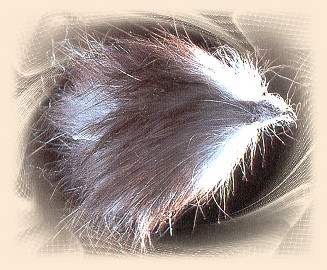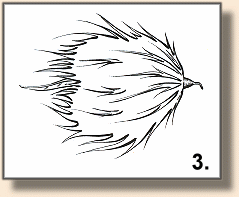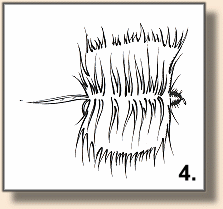|
The Creature is one of the simplist flies in intent.
It imitates a small mammal of some kind. Most anglers
have either seen or can picture an animal swimming in
a trout stream. The fly is fished the same way.
Anyone who cannot imagine a swimming creature, a little
frantic, trying to reach land, should borrow a Pekinese
puppy. He can take that bit of fluff out in a boat to the
middle of a river and toss the puppy into various types of
water - a slow pool, a choppy riffle, a white-capped
riffle - all the time studying how the animal reacts to
these currents. It is best to choose a river without pike,
bass, or unusually large trout for this training exercise.
The Creature doesn't have to be tied on large hooks. It
is a less intimidating fly, even for big trout in baby sizes.
The pattern, a puff of fur, has worked well on size 14,
long-shank streamer hooks. Still, it takes a predator to grab
the Creature, and in my experience it is a waste of time
casting it on streams that lack good population of one-pound
browns or two-pound rainbows.
My favorite rivers for the Creature are winding brushy flows,
every out sweep, a deep undercut. On that kind of smooth,
dark water the fly cuts a clear arc on the surface. The
trout do not atack the Creature like a streamer. On the
tiny sizes they frequently just suck it down. On the bigger
sizes the fish often burst up under the fly instead of
chasing it, and then the angler has to wait for the jumping
trout to turn downwards before setting the hook.
My best fish on a Creature was caught many years ago, in the
Bob Marshall Wilderness on the South Fork of the Flathead,
in the huge pool where the Danaher comes in. A bull trout
drifted up slowly from the bottom and rolled on a size 8 Brown
creature sitting dead on the surface. That fish weighted
twelve pounds.
Materials
Hook: 2-8 up-eyed Atlantic salmon dry fly,
TMC 7989.
Foundation: Yarn (wrapped and soaked with glue.)
Skin: Rabbit fur still on the skin.
Tail: White calf tail.
Head: Dubbed fur.
Tying Steps:
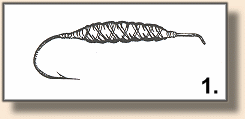
1. Wrap the hook with yarn and spread head cement;
slit a cylinder of foam or balsa and fit it over the
hook shank; close the slit with Zap-a-Gap glue.
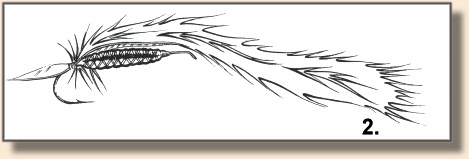
|

